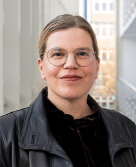Biography
Jasmin Grosinger is Full Professor of Communication Engineering at the University of Siegen, Germany. Her research focuses on sustainable wireless communication systems. Previously, she was Associate Professor at the Institute of Microwave and Photonic Engineering at Graz University of Technology, Austria, and from 2023 to 2025 served as Visiting Associate Professor at the Graduate School of Engineering at Tohoku University, Japan.
She is a Senior Member of the IEEE and co-author of numerous peer-reviewed publications, book chapters, and invention disclosures. Her work has been recognized with several awards, including the Jubilee Foundation Prize of the Federation of Austrian Automotive Industry for her PhD research and the Mind the Gap – Diversity Award of Graz University of Technology (2021).
Prof. Grosinger served as Associate Editor for the IEEE Microwave and Wireless Technology Letters (2019–2024) and currently acts as the inaugural Editor-in-Chief of the IEEE Journal on Wireless Power Technologies. Within the IEEE Microwave Theory and Technology Society (MTT-S), she contributes to Technical Committees 25 (Wireless Power Transfer and Energy Conversion) and 26 (RFID, Wireless Sensors, and IoT). She is a Distinguished Microwave Lecturer-Emeritus, an Elected Voting Member of the MTT-S Administrative Committee (since 2023), and served as Meetings and Symposia Chair (2024–2025). Since 2026, she has served as Chair of Member and Geographical Activities.
Presentations
RF Design for Ultra-Low-Power Wireless Communication Systems: Efficiently Miniaturizing and Passively Sensing
In this talk, I will present radio frequency (RF) design solutions for wireless sensor nodes to solve sustainability issues in the Internet of things (IoT), which arise due to the massive deployment of wireless IoT nodes on environmental and economic levels. Engineers can apply these RF design solutions to improve the ultra-low-power operation of IoT nodes, avoid batteries’ eco-toxicity, and decrease maintenance costs due to battery replacement. The presented solutions offer high integration levels based on system-on-chip and system-in-package concepts in low-cost complementary metal-oxide-semiconductor technologies to limit costs and carbon footprints of these nodes. Within this research context, I will present solutions for ultra-low-power wireless communication systems based on high frequency (HF) and ultra-high frequency (UHF) radio frequency identification (RFID) technologies. In particular, I will present RF design solutions for HF and UHF RFID systems that reveal how to develop passive miniaturized IoT nodes that operate robustly in harsh application environments and how to create batteryless or rather passive IoT nodes, which provide passive sensing capabilities and work robustly in their respective application environment.
